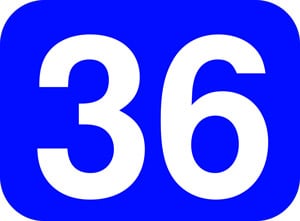What is the highest possible score on the ACT, and how rare is it to get one? Whether you're just now diving into your ACT prep or have been at it for a while, you're probably wondering what the best score is. In this guide, we'll explore the odds of earning the maximum ACT score and give you tips and advice for reaching it.
What Is a Perfect ACT score?
The highest possible score you can earn on the ACT is 36 (on a scale of 1-36).
This 36 is a composite, or average, of your three subject area scores—English, Reading, and Math. (Note that Science has recently become optional and is no longer included in the composite score. You'll receive a separate score from 1-36 for it.) Each section is scored on a scale of 1-36. If you take the ACT with Writing, your essay will not affect your composite score. This means you can get a perfect 36 without earning a perfect 12 on the essay.
The 36 points you can earn on each section are scaled scores, which are translated from your raw scores—that is, the total number of questions you get right on each ACT section. (For more information about how each ACT section is scored, see our article on ACT scoring.)
So just how rare is a perfect 36? According to ACT, out of the 1,374,791 students in the class of 2024 who took the ACT, only 3,041 earned the highest possible ACT score. That's just 0.22% of test takers!
If you're looking to be part of that 0.22%, keep reading to learn the raw ACT scores you'll need for each section—and why it's possible to get a perfect score without answering every single question correctly.
The Composite ACT Score Needed for a 36
Your composite score on the ACT is the most important part of your score, since it represents your overall performance. When people refer to a perfect ACT score, they are talking about a perfect 36 composite.
However, since your composite ACT score is calculated from the average of your three subject area scores—not the total—you do not need a perfect 36 on every section to get a perfect 36 composite.
For example, say you got the following subject area scores:
- English: 36
- Reading: 36
- Math: 35
This means your composite would be as follows:
(36 + 36 + 35) / 3 = 35.6
Because you can only get whole numbers—not decimals—for your composite ACT score, this score of 35.6 would round up to the best ACT score of 36.
This is slightly different from the SAT, for which your composite score comes from all the sections being totaled, not averaged. To get a perfect score on the SAT, you need a perfect score on every section. For the ACT, you can have a slightly less than perfect score on one section and still net a 36 composite!
The Raw Scores Needed for a Perfect ACT Score
While it's possible to get a 36 composite without getting a 36 on each ACT section, if you're truly aiming for a 36, you should study with the goal of getting a 36 on each section.
But why? First of all, this will help you focus your studying on becoming 100% consistent. If you study with the allowance of making a few mistakes, any additional mistakes you make will definitely cost you the 36.
But if you study with the goal of getting a 36 on each section, if you do end up making one or two mistakes, you could still net a 36 composite.
This official chart estimates how raw ACT section scores will translate into scaled scores.
In other words, you need to aim for a perfect raw score—that means answering every single question correctly—on Reading to get a 36. Meanwhile, you can miss one question each on the English and Math sections and still get a 36.
While these estimates show it is possible to get 72 raw points on the English section and 58 points on the Math section and still get a 36 composite, this could change depending on how the ACT you end up taking is scaled. (This is because each test is scaled a little bit differently—check out our guide to ACT conversion charts to learn more about how this process works.)
Ultimately, the only way to guarantee a 36 is to get a perfect raw score in every section.
How to Get Perfect Raw ACT Scores to Guarantee a 36
If you're aiming for a perfect ACT score, the best way to do this is to aim for a perfect raw score on every ACT section (in other words, aim to get every single question right!). Here, we go over our top tips to help you do just this.
#1: Be Consistent and Maintain Your Stamina
Since you're aiming for a perfect raw ACT score on every section, you must be able to achieve perfection during studying and while taking practice tests. This is especially important for developing better test-taking stamina and efficiency.
Even if you're capable of answering all the questions in a section correctly, to get a perfect 36 on the ACT, you will have to be able to work within the allotted time. Here is an overview of the time limits per ACT section:
| ACT Section | Total Time | # of Questions | Time per Question |
| English | 45 minutes | 75 | 36 seconds |
| Math | 60 minutes | 60 | 60 seconds |
| Reading | 35 minutes | 40 | 52.5 seconds |
For the Math section, you get exactly one minute per question. For English and Reading, you get less than a minute. This intense pacing is why it's so important to aim for speed and accuracy while studying.
#2: Find Your Weak Spots
Our second tip is to use ACT practice questions and exams to find your weak areas—whether they are trigonometry questions on the Math section or the social science excerpt on Reading.
Try to figure out where the gaps in your knowledge are and why you are answering certain questions incorrectly. Once you know exactly where you struggle, you can target your studying.
To get a 36, you must learn the concepts behind the questions you struggle with the most and develop systems and strategies for solving those question types.
With enough studying, your weak links could become strengths.
#3: Don't Get Complacent
Although you’ll spend a good deal of time on your weak spots, never assume that you have a section in the bag. For example, even if you're amazing at math and got a 36 on your first official practice test, don't neglect the Math section when you study.
Taking practice tests can help you become familiar with the pacing you will need on test day, and they'll also help you spot any careless mistakes you tend to make.
#4: Prevent Careless Mistakes
Although the bulk of your studying will be spent addressing stubborn weak spots, make sure you are on the lookout for where you make small mistakes. That could be anything from skimming too fast and missing the point of a question, to an arithmetic error on Math, to even bubbling in an answer incorrectly.
Want more strategies on how to get the maximum ACT score? Read our detailed guide to getting a 36.
Key Takeaways: Aiming For the Maximum ACT Score
Although it will be tough to study for that perfect 36 ACT score—after all, only 0.25% of test takers achieve it!—it's not impossible.
Keep in mind, too, that although a 36 composite is considered perfect, a composite score of 34 or higher is already in the 99th percentile of test takers. In other words, if you get a 34+, you’ve done better than 99% of students who’ve taken the ACT. That's a great accomplishment!
Studying using the principles in this article and aiming for perfection can definitely help you get a 99th percentile ACT score—which isn't too shabby, even for a perfectionist.
What's Next?
Want a more in-depth guide to getting a perfect ACT score? Read our guide on how to score a 36, written by a 36 perfect scorer.
Aiming for a top-tier school? Learn what ACT scores it takes to get into the Ivy League.
Not aiming for a perfect ACT score? You'll still need to figure out what score you should aim for, and get the best one you can. Read our step-by-step guide to calculating your personal ACT target score to get started.
















